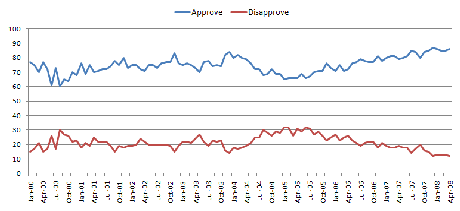For many years, corruption has been a normal part of life in the post-Soviet Russia. Oligarchs would bribe ministers for government contracts, ministers would bribe judges, and those who could afford it would bribe the government officials on the street. That might have changed after Yeltsin stood down, but in relation to the other crises at the time (economy, Chechnya, etc.) it has been less than satisfactory.

Putin’s approval ratings up until 2008. Compare with today – http://www.levada.ru/indeksy
Having a popularity rating around 70% or more meant there was little to gain in tackling a resistant and toxic problem. A booming economy too, meant that the money lost through bribery and corruption was ‘affordable’. However, both the high rating by the public and seemingly endless boom were not to last. We can see now how the Russian state is being influenced by 1) a weaker economy, and 2) a more demanding populace.
The Active Citizen
The current ruling party, United Russia, has been increasingly viewed by the oppositionist blogger Alexei Navalny’s term – the “party of crooks and thieves”. Amid unexpected mass demonstrations, and a stronger opposition holding the Kremlin to account, President Vladimir Putin was forced to genuinely take the corruption problem head-on.
Last December, Medvedev outlined three conditions needed to be able to fight corruption effectively:
- Political Will (of the leadership)
- Political Demand (of the constituents)
- Legislative Foundation
Since then, the Kremlin (or at least enthusiastic minorities within) have been slowly building upon these three preconditions.
Political will has been encouraged, and in some instances, coerced. The former Defence Minister, Anatoly Serdyukov, was sacked and put under investigation after it was alleged that he had sold ministry assets for his own benefit. One of the previous ‘rules’ of Russian politics was that if you were in Putin’s circle and stayed loyal, then you could expect at least the same. Serdyukov was loyal, but corrupt, does this imply a new principle in Moscow? Putin claimed that he removed Serdyukov to foster ”conditions for an objective investigation”.
There has been a strong and active citizen involved in anti-corruption too. The recent citizen journalism that exposed Vladimir Pekhtin and his undeclared assets was a catalyst that led more to go, and will have unforeseeable consequences in the Duma. Two similar legislators, Lomakin and Tolstopyatov, rapidly followed suit. More lower house representatives will apparently be affected soon, and word is that it will affect the upper house too. Olga Kryshtanovskaya remarked that:
A certain section of the elite is in a state of obvious confusion. People do not understand what is happening. They doubt whether they can exist within this system. Some are leaving. Some are being dismissed …
Along with this, Russia has acted upon its less than favourable judiciary, and enacted stronger legislation. Membership in the OECD’s anti-bribery convention proved a moment where there was no turning back, either the current political elite solves this or they fall with it.
The Austerity Alternative
The government currently loses hundreds of billions of dollars every year due to corruption or ‘grafting’. Since the economic crisis, growth has slowed to a modest 2.2% at last view.
Stronger legislation since mid-2012 has enabled senior officials such as the CEO of the state electricity firm MRSK, ex-ministers such as Yelena Skrynnik, and high profile government contractors such as Yury Urlichich, to be held to account in front of the law.
In 2012, the government stopped altogether state-owned companies to subcontract other companies where the ownership was not known. State officials and representatives have been forced to declare incomes, interests, and assets.
However, most importantly, arrests have been made, it seems for all the media hype there is actually something important going on here.
Related articles
